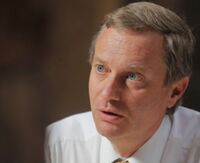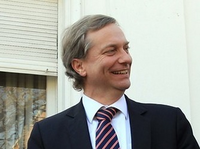Vincent Lloyd: Difference between revisions
m (1 revision imported) |
mNo edit summary |
||
| Line 60: | Line 60: | ||
|residence = 9 Barkfield Street | |residence = 9 Barkfield Street | ||
|alma_mater = University of Castelby | |alma_mater = University of Castelby | ||
|website = [http://www.barkfieldstreet. | |website = [http://www.barkfieldstreet.ab www.barkfieldstreet.ab] | ||
|signature = | |signature = | ||
}} | }} | ||
Revision as of 00:08, 26 February 2019
The Right Honourable Vincent Lloyd | |
|---|---|
 | |
| Chancellor of Albeinland | |
| Assumed office 12 December 2018 | |
| Monarch | Catherine II |
| Deputy | Elizabeth Smith |
| Preceded by | George Whestling |
| Leader of the Conservative Party | |
| Assumed office 12 December 2018 | |
| Monarch | Catherine II |
| Deputy | Adam Jones |
| Preceded by | Oliver Harman |
| Leader of the Opposition | |
| In office 24 February 2011 – 12 December 2018 | |
| Preceded by | George Whestling |
| Succeeded by | Thomas Corbyn |
| Member of Parliament for Grenford | |
| Assumed office 12 June 1999 | |
| Preceded by | Tom Hifax |
| Personal details | |
| Born | Vincent Frederick Lloyd 8 February 1976 Grenford, Albeinland |
| Died | office5 |
| Resting place | office5 |
| Political party | Conservative Party |
| Spouse | Emily Lloyd (m. 1998) |
| Children | Olivia (b.2000) |
| Parent |
|
| Residence | 9 Barkfield Street |
| Alma mater | University of Castelby |
| Website | www.barkfieldstreet.ab |
| ||
|---|---|---|
|
Chancellor of Albeinland Incumbent
|
||
Vincent Frederick Lloyd (Grenford, born 8 February 1976) is the Chancellor of the Kingdom of Albeinland.
Born in the town of Grenford, Lloyd is one of the youngest people to serve as Chancellor in Albeinland and the youngest conservative politician to hold the office. Son of civil servants, Lloyd graduated in law in 1999 and began living in Castelby in the same year, where he started to be interested in politics and becoming a MP for his native constituency in June. In the parliament, Lloyd gained popularity due its oratory and quickly owned space inside the Conservative Party, becoming Leader of the Opposition during the centre-left government of George Whestling in 2011. In the 2018 general election, Lloyd was nominated to be the conservative candidate for Chancellor, winning with 59% of votes against the social democrat Thomas Corbyn and the liberal Suzan Collins. Furthermore, Lloyd was inducted as the Leader of the Conservative Party.
Ideologically, Lloyd classifies himself as a civic nationalist and a liberal conservative, defending most of the conservative guidelines such as against the legalization of abortion and the drugs for recreational use. During his office as MP, Vincent approved or proposed a series of laws that stimulates mainly in schools and the society in general projects that promoted the history and culture of Albeinland, as well as the organization of events with the promotion of literature, philosophy and national art, bearing the title of an intellectual politician. Since when he became Chancellor in December, Lloyd remained with a popularity above 50%, being viewed positively by the majority of the population.
Early life
Vincent Lloyd was born in the town of Grenford on February 8, 1976, being the youngest brother among Henry, George and Abraham. Son of civil servants, his father served in the Royal Army for 15 years, being a sergeant before become a reservist and an employee of the Local Authority of Grenford while his mother was a receptionist of a NHS unit in the city. With northern progeny, Lloyd already said in interview that he only started attending school at the age of nine, with his mother teaching basic grammar and maths to him at home. As his father wanted him in the army, Vincent began attending public education at the Bannister College in 1985 in the city of Rosefort, where he learned history, geography, Latin and algebra. Due to his high grades and sociable behavior, Lloyd became quite popular at school.
One of the main events that made Lloyd became interested in politics happened in 1992 at the age of 16 when he began working as an assistant and receptionist for Sir Alan Frost, a local nobleman who was in the time a member of the House of Lords. Lloyd worked there for 3 years, with Sir Alan, in his spare time, teaching basic lessons from the political scene at the time and encouraging him to stand in the upcoming elections due his charism.
In 1994, the nobleman promised to pay for his teaching if he pass in the University of Castelby. Lloyd was approved in February and began to study political science in the same year.
Education
After being approved by the University of Castelby to study political science, Lloyd moved to the city in 1995 to focus entirely on his studies, living together with Emily Sparks - a college classmate who would later become his wife. In 1998, as he was about to graduate, Lloyd became even more interested in politics. According to an interview, Vincent attended debates and lectures, with his interest intensifying even more in June of that year, when he began attending a pub in Luffton - a borough located in the central zone of Castelby - frequented by conservatives.
In addition to study political science, Lloyd also studied law at the same university, graduating in 1999.
Political career
MP for Grenford
Lloyd graduated in 1999 and decided to move to Grenford along with his wife Emily in March. He continued to work with Sir Alan and decided to join the youth wing of the Conservative Party in April, attending regional party meetings. In June, the then MP for Grenford and member of the Social Democratic Party Tom Hifax resigned on account of a cancer, with by-elections taking place in the same month. Lloyd was nominated by the Conservative Party and won with 37% of the votes at the age of 23, becoming one of the youngest politicians to be elected to the House of Commons and gaining national prominence due it.
The early years of Lloyd in the parliament were very timid mainly because of his age and the situation that his party was facing in the time (the Conservative Party was a member of the opposition since 1952). In 2000, during the Chancellor's Questions of October, Lloyd raised his first question regarding the situation of historical buildings in Castelby and Rosefort. It was questions like this - more related to routine matters - that made up Vincent Lloyd's early years in the House of Commons, remaining unknown in the parliament. This situation has just begun to change in 2002, when Lloyd addressed against the then Chancellor Robert Brewster about the tax increase for mining companies. The oratory and level of the speech for a simple young politician caught the attention of the conservative leadership, which intensified his holdings inside the party.
During the 2003 general election, Lloyd supported Eric Chamberlain for be the party's official candidate for the office of Chancellor. With Chamberlain's victory in the polls, Lloyd was appointed as the leader of the conservative youth wing, coordinating it until 2011. During these years, Lloyd helped in the introduction of a series of reforms inside the party that had been in opposition since 1952, expanding the support among the younger classes and modernizing the party using social networks and other media that ensured the highest possible popularity, while he gained more space in the House of Commons. In 2005, Lloyd had its first law passed in the parliament in which relaxed the use of outsourced companies in the public sector. In 2006, he inaugurated the Conservative Party's Annual Congress, supporting Chamberlain's pro-market policies and defending better conditions for small and medium-sized businesses.
Between the years of 2006 and 2010, Lloyd had three own projects approved in the parliament, being more focused in cultural and educational areas. Due this attention given to museums, heritage and arts in general, Vincent was called as a "young, intellectual and brilliant politician" by the Citizen magazine in May 2008.
In 2010, Eric Chamberlain resigns after seven years of government in favor of his deputy Arthur Irves. Although Chamberlain's decision was seen as favorable, Lloyd confronted Irves several times during his one-year rule mainly because of his more liberal measures. These clashes plus many other factors were responsible for the division of the conservative government in just one year, leading to general elections in 2011, in which Irves was hopeful to win.
2011 general election
General elections were scheduled for January 2011 in November 2010 as a way to resolve the internal conservative stalemate as well as the opposition coalition composed by the Social Democrat and Liberal parties formed in November, with the conservatives having a minority government without any stability. The party members become divided as to who should be the conservative candidate, with moderate and liberal wings supporting Irves while the more conservative faction supported Lloyd. Chamberlain still held the position of leader of the party, and, since he was an ally of both politicians, he resigned and declared elections for the leadership of the Conservative Party in December. Both Irves and Lloyd were the first to announce that they would run in the leadership elections to validate their candidacy in the general election.
The immense division inside the party caused a bad image to the public and the press, with the social democrats taking advantage of this division to strengthen itself. In addition to the weakening and the massive drop in voting intentions for the conservatives, the party elections were extremely close to the general election made that the winner did not have the time to organize their projects and even participate in most of the debates, with the Citizen magazine calling the conservative campaign as a "total failure".
Realizing the political wear and the popularity slump that he was suffering, Lloyd decided to drop his candidacy two weeks before the election and declared support for Oliver Harman, who winned Irves. Many see the Lloyd's withdrawal as an act that saved his own political career.
Leader of the Opposition
Despite the defeat at the polls and a social democrat victory, many conservative members saw Oliver Harman's leadership victory - which had a more unifying speech inside the party - as an opportunity to reform its internal structure and prepare to regain the strongest support possible. Lloyd, who didn't have his image completely fragmented, managed to remain in the Conservative Party leadership, and, being a Harman's friend, he was appointed as the Leader of the Opposition against the centre-left government of George Whestling. Whestling was one of Lloyd's biggest opponents early in his career, which increased the friction between opposition and government in the early years.
However, the low number of conservative members in the parliament failed to prevent the passage of social democratic reforms, who also made an agreement with the liberals. In 2012, one of Whestling's most controversial projects, which authorized a tax increase in addition to an extensive labour rights plan, was heavily criticized by the Conservative Party on the grounds of undermining national exports. The approval of the act further damaged the image of conservatives in the Albish society, with Harman giving more powers to Lloyd to conduct party activities within the House of Commons.
In 2015, the Conservative Party, after a year of negotiations, made an agreement with the Albish Nationalist League - which contained 6 MPs at the time - to form part in the opposition coalition, which increased the chances of blocking government projects. Lloyd also entered into agreements with the Liberal Party in 2016 for not support the social democratic government anymore in secret. However, in January 2017, the leak of the talks created a crisis inside the government that ended in the breakup between the liberals and social democrats in the same year. Lloyd's victory was widely celebrated in conservative newspapers, which paved his way in the next election.
Despite losing its main support, the Social Democratic Party managed to stay in the government until the next elections in 2018, thanks to a coalition with the Green Party.



